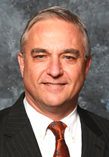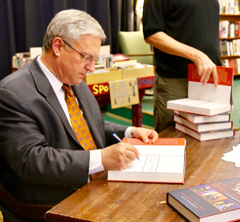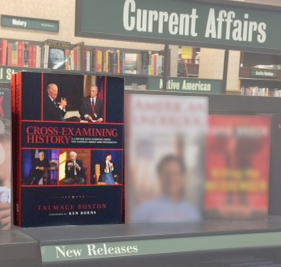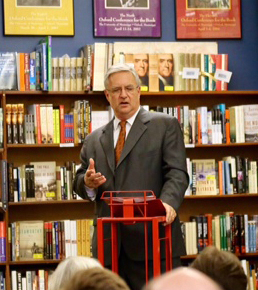© 2016 The Texas Lawbook.
By Mark Curriden
(Oct. 6) – Talmage Boston had just finished kindergarten when a neighbor in Houston introduced him to the world of baseball cards.
Boston spent hours absorbing the statistics on the back of the cards.
Horrified that her son was wasting time and brain cells on frivolous matters, Boston’s mother, who was a school teacher, found a possible solution: she bought her son trading cards with presidential photos on the front and information about their time in the White House on the back.
“It gave me two passions,” Boston says. “That’s how my love for baseball and presidential history came to me. It was all in the cards.”

He’s a shareholder at the large Dallas corporate law firm Winstead, where he has represented some of the region’s biggest companies, including Fannie Mae, ORIX Capital Markets and Bank of Texas, in highly complex disputes.
More envious to other trial lawyers is that Boston has discovered success as a writer. He’s penned about 140 articles for The Dallas Morning News, the Dallas Business Journal and the Texas Bar Journal.
He has authored four books, including two about baseball and one about the role of lawyers in society.
His newest treatise, Cross Examining History: A Lawyer Gets Answers From the Experts About Our Presidents, combines the 63-year-old’s expertise in questioning witnesses in the courtroom with his passion for presidential history.
In the 500-page hardback, Boston conducts public interviews of three dozen presidential historians, authors and political insiders – James Baker III, Henry Kissinger, Andy Card, Jon Meacham, David McCullough, Ken Burns and Douglas Brinkley, just to name a few – in an effort to get them to reveal insights, anecdotes and analyses that are unique or previously undisclosed.
“My goal was to make some sort of advancement on the study and knowledge of presidential history – maybe move some of history’s gray areas into the open,” he says. “The overwhelming lesson is that presidents should be judged by their circumstances and the facts they faced at the time. Look at how things were in that era.”
While Cross Examining History mostly clarifies or explains the intentions and actions of past presidents, it occasionally breaks new ground and reveals facts that counter general historical conceptions.
“The greatest ‘ah-ha moment’ came in my interview of [John F. Kennedy Presidential Library historian] Sheldon Stern,” Boston says. “We learned the popular view of Robert Kennedy and the 13 days of the Cuban missile crisis was all wrong.”
Stern told Boston in an October 2015 interview that the Kennedys secretly recorded their classified meetings and that he had listened to every minute of the audio recordings.
“Thanks to Kennedy flunky Ted Sorenson and Robert Kennedy’s self-serving book, Thirteen Days: A Memoir of the Cuban Missile Crisis, popular history is that RFK was the hero behind closed doors,” Boston says. “Stern told me that the tapes clearly reveal RFK was a military hawk who wanted to play tough and was advocating going to war. The only cool head in the courtroom was JFK.”
 Boston says he spent hundreds of hours reading books and conducting research preparing for the interviews with the experts.
Boston says he spent hundreds of hours reading books and conducting research preparing for the interviews with the experts.
Those experts quoted in the book say Boston’s questions are as important as their answers.
Former Newsweek editor and presidential biographer Evan Thomas calls Boston “a gifted interviewer” who “knows how to draw out deeper truths.” Abraham Lincoln biographer Harold Holzer describes Boston as having the “curiosity of Charlie Rose” and the “gravitas of Edward R. Murrow.”
Born in San Antonio, Boston’s father was an executive at Mobil Oil and his mother taught high school Spanish. Together, they watched Perry Mason every week solve great mysteries in the courtroom through the tough cross-examination of witnesses.
“I loved it that Perry Mason could find out the truth by asking these devastating questions,” Boston says. “I knew then that I wanted to be a lawyer.”
Then came Atticus Finch in To Kill a Mockingbird. Boston says it still sends chills up his spine in the scene when Finch packs up his briefcase and starts to leave the courtroom. Instantaneously, the scores of African-Americans relegated to the balcony to watch the trial stand.
The Rev. Sykes turns to Scout. “Jean Louise, stand up,” he says. “Your father is passing.”
 “The fact that lawyers could accomplish such great things and command that kind of respect, I wanted to be that kind of lawyer,” Boston says.
“The fact that lawyers could accomplish such great things and command that kind of respect, I wanted to be that kind of lawyer,” Boston says.
In junior high and high school, he joined the debate teams. He ran for student body president at the University of Texas, but lost in a squeaker.
A graduate of the University of Texas and UT School of Law, Boston has practiced law for 38 years – the past 19 years as a shareholder at Winstead. He argued two cases to the Texas Supreme Court and two to the U.S. Court of Appeals for the Fifth Circuit. He’s been the lawyer of record in 24 published opinions for executives and companies involved in commercial real estate, banking, energy and construction industries.
Boston has been involved in several high profile cases.
In the late 1980s, he represented Stallworth Oil & Gas Major in a multi-year oil and gas contract dispute that resulted in a Texas Supreme Court precedent that has been cited nearly 50 times in subsequent cases.
A few years later, Boston defended computer device maker Federal Communications Corp., which was sued by a competitor, Texas Commercial Business Systems, for alleged tortious interference with business. Boston successfully defeated the plaintiffs RICO in the U.S. District Court and then convinced a three-judge panel at the U.S. Court of Appeals for the Fifth Circuit to unanimously uphold the lower court’s judgment.
More recently, Boston represented Daniel L. Jackson, who was the receiver for Hill 3 investments, Ltd., which is a partnership owned jointly by Albert Hill, Jr, and Al Hill, III. Boston sued Hill III as part of the multi-year heated dispute between father and son.
He secured a $6 million judgment and was awarded $900,000 in legal fees.
“I love practicing law, but it alone will not fulfill me,” he says. “Writing is my creative outlet. Some people paint. Some people turn to music. Writing allows me to delve into my imagination.”
Boston’s first non-law-related article was a story he wrote about the first meeting between Jackie Robinson and Brooklyn Dodgers owner Branch Rickey in August 1945. Baseball magazine Elysian Fields Quarterly published the article in 1991.
 A decade later, Boston chose baseball as his topic for his first book, 1939: Baseball’s Tipping Point, which was published in 2005. Four years later, he authored Baseball and the Baby Boomer. Boston’s fourth book, Raising the Bar: The Crucial Role of Lawyers in Society, examined four lawyers who should be role models – Abraham Lincoln, Leon Jaworski, James Baker III and fictional lawyer Atticus Finch.
A decade later, Boston chose baseball as his topic for his first book, 1939: Baseball’s Tipping Point, which was published in 2005. Four years later, he authored Baseball and the Baby Boomer. Boston’s fourth book, Raising the Bar: The Crucial Role of Lawyers in Society, examined four lawyers who should be role models – Abraham Lincoln, Leon Jaworski, James Baker III and fictional lawyer Atticus Finch.
Boston says he was looking for his next big writing project when he read Stanford University Business School adviser Greg McKeown’s book Essentialism: The Disciplined Pursuit of Less.
“It changed my life,” he says. “It turned my life upside down and then right side up. It made me think about all my life experiences, talents and abilities and interests and passions [and then] visualize one big thing.”
Boston says Cross Examining History was that one big thing.
“I decided to use my trial lawyer skills at questioning and cross-examining folks and my love of history and my access to leading historians and my life long passion for learning about president history to be a force for the study, knowledge and advancement of presidential history,” he says. “I read the best books on president history and then scheduled interviews.
“I wanted to get the juiciest nuggets of food for thought from our top experts and put it out there for the reader’s perusal with information from the experts,” he says.
Boston points to his interview of former Newsweek editor and Thomas Jefferson biographer Jon Meacham.
“John, we are now in the second decade of the 21st century,” Boston said he told Meacham. “Let’s assume the Jefferson Memorial was never built. But let’s assume that a Congressman this year wanted to build the memorial now using federal funds. Knowing what we know today about what Jefferson did with his slaves at Monticello, would a bill to fund a new Jefferson Memorial be passed by Congress?”
Meacham paused, smiled and answered, “No, that bill would not pass today given the slavery issue.”
“When the program ended, Meacham told me that it was the best question he had been asked,” Boston says.
Boston says that he considers Abraham Lincoln to be our greatest president.
“Lincoln faced the biggest challenges – a country divided, the biggest issue in our country’s history and a war in which 700,000 people were killed – and yet he never lost his vision, compassion and brilliance,” he says. “He had all kinds of personal tragedy and yet he piloted the ship through the storm.”
Boston says he looked for ways to make this project a “win-win” for Winstead and his clients through business development events.
“I looked for ways for Winstead to be pleased that one of its lawyers was being published and that I was improving the firm’s place in the community,” he says. “Bringing in authors was a win-win. Clients and partners got to meet the speakers up close and personal.”
“Plus, it’s pretty cool that Henry Kissinger, Ken Burns and David McCullough are in my Rolodex,” he says.
© 2016 The Texas Lawbook. Content of The Texas Lawbook is controlled and protected by specific licensing agreements with our subscribers and under federal copyright laws. Any distribution of this content without the consent of The Texas Lawbook is prohibited.
If you see any inaccuracy in any article in The Texas Lawbook, please contact us. Our goal is content that is 100% true and accurate. Thank you.
